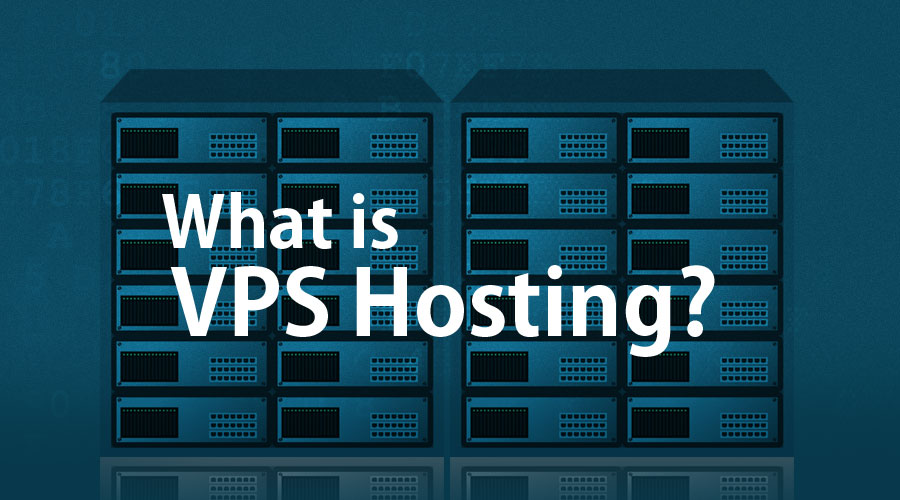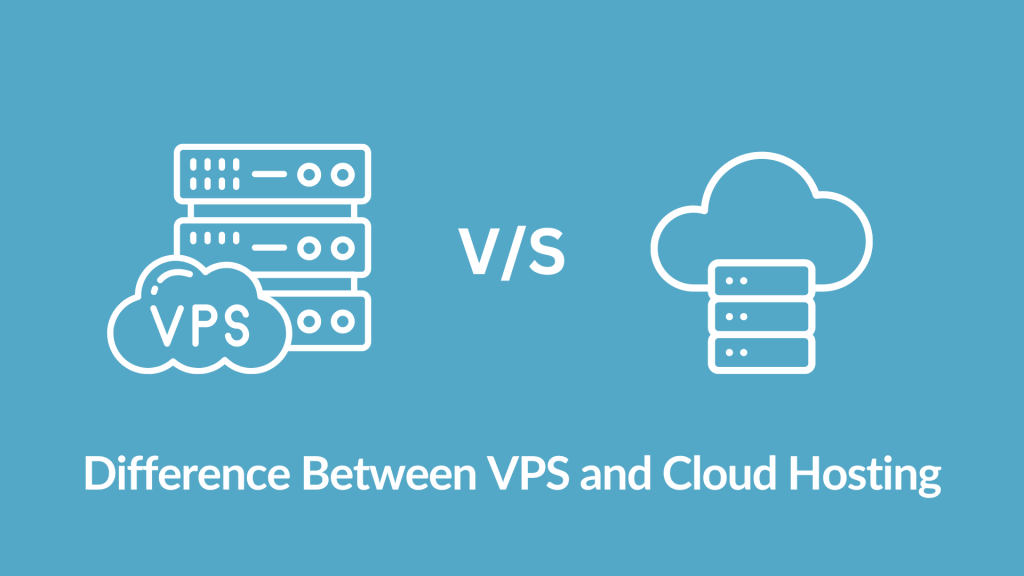
Cloud Hosting vs VPS Hosting: Understanding the Features, Benefits, and Key Differences
Table of Contents
What is a VPS?

A VPS, or Virtual Private Server, is a virtualized server that acts as a dedicated server within a larger physical server. In a VPS hosting environment, a single physical server is divided into multiple virtual servers, each of which has its own operating system, resources (such as CPU, RAM, and storage), and is isolated from other virtual servers on the same physical machine.
VPS hosting provides more control and customization compared to shared hosting, where multiple users share the resources of a single server. With a VPS, users have greater flexibility to install and configure software, run custom applications, and have more control over server settings. It offers a middle ground between shared hosting (which is more limited in terms of customization) and dedicated hosting (which involves an entire physical server for a single user).
VPS hosting is commonly used by businesses and individuals who need a scalable hosting solution with more control and resources than shared hosting but without the cost and complexity of a dedicated server. It’s suitable for hosting websites, applications, and other online services.
What is cloud hosting?

Cloud hosting is the process of outsourcing an organization’s computing and storage resources to a service provider that offers its infrastructure services in a utility model.
The cloud provider oversees the setup, cloud infrastructure, security and maintenance. The provider sometimes allows clients to customize hardware and applications and scale servers online. Compute and storage resources are spread out across hundreds of virtual machines that load balance input/output demands in a cloud infrastructure configuration.
The cloud hosting model is a cheaper alternative to the traditional dedicated server model that requires companies to build and manage their own data centers. In the traditional model, servers and storage, with dedicated hardware and virtual resources, reside on premises and can be a costly capital and operating expense for organizations.
VPS Hosting: Overview and Benefits
VPS hosting, or Virtual Private Server hosting, is a type of web hosting where a physical server is partitioned into multiple virtual servers, each operating independently with its own dedicated resources and operating system. Here’s an overview of VPS hosting and its benefits:
Overview:
- Virtualization Technology: VPS hosting relies on virtualization technology, typically using a hypervisor, to create isolated virtual servers on a single physical machine.
- Isolation: Each virtual server on a VPS operates independently, with its own dedicated resources (CPU, RAM, storage) and isolated file system. This isolation ensures that the performance and activities of one VPS do not directly impact others on the same physical server.
- Operating System Control: Users have control over the choice and configuration of the operating system on their VPS. This allows for greater customization and flexibility compared to shared hosting.
- Root Access: VPS hosting often provides users with root access or administrative privileges, enabling them to install and configure software, modify system settings, and have more control over the server environment.
- Scalability: While not as scalable as cloud hosting, VPS hosting still offers a degree of scalability. Users can upgrade or downgrade their plans to adjust the allocated resources based on their changing requirements.
- Cost-Effective: VPS hosting is often more cost-effective than dedicated hosting. It provides a balance between the cost savings of shared hosting and the customization of dedicated hosting, making it suitable for businesses and individuals with specific requirements.
Benefits:
- Increased Performance: VPS hosting offers better performance compared to shared hosting since resources are dedicated to individual virtual servers. This results in faster loading times and improved overall server responsiveness.
- Customization: Users have the freedom to install and configure software, as well as adjust server settings based on their specific needs. This level of customization is beneficial for users with unique hosting requirements.
- Reliability: The isolation of virtual servers on a VPS contributes to increased reliability. Issues on one virtual server are less likely to affect others, providing a more stable hosting environment.
- Security: VPS hosting provides a higher level of security compared to shared hosting. The isolation of virtual servers ensures that each VPS operates independently, reducing the risk of security breaches caused by activities on other servers.
- Root Access: Having root access allows users to have full control over the server environment, making it easier to implement security measures, install custom applications, and perform system-level optimizations.
- Affordability: VPS hosting is often more affordable than dedicated hosting, making it a cost-effective solution for users who require more resources and customization than shared hosting but do not need an entire physical server.
- Better Control: Users have greater control over their hosting environment, including the ability to restart the server, install custom software, and configure server settings without affecting other users on the same physical machine.
Cloud Hosting: Overview and Benefits
Cloud hosting is a form of web hosting that utilizes the resources of multiple servers connected in a virtualized environment to provide scalable and reliable hosting services. This approach offers several advantages over traditional hosting models. Here’s an overview of cloud hosting and its benefits:
Overview:
- Virtualization: Cloud hosting involves virtualization technology, where a hypervisor is used to create and manage multiple virtual servers on a physical machine.
- Distributed Resources: Resources such as CPU, RAM, and storage are distributed across a network of interconnected servers. This distribution allows for efficient resource utilization and load balancing.
- On-Demand Scalability: Cloud hosting platforms allow users to easily scale resources up or down based on their requirements. This scalability is particularly beneficial for handling variable workloads and traffic spikes.
- Redundancy and High Availability: Cloud hosting providers typically operate in multiple data centers across different geographic regions. This redundancy ensures high availability, as data and applications can be mirrored across multiple servers. If one server or data center experiences issues, another can seamlessly take over.
- Pay-as-You-Go Model: Many cloud hosting services operate on a pay-as-you-go pricing model. Users are billed for the resources they consume, allowing for cost optimization. This is in contrast to traditional hosting models where users may pay for a fixed amount of resources regardless of usage.
- Self-Service Interface: Cloud hosting platforms offer user-friendly interfaces that allow users to manage and configure their hosting resources easily. This self-service model empowers users to control their environment without requiring extensive technical expertise.
Benefits:
- Scalability: Cloud hosting provides the ability to scale resources quickly to accommodate changes in demand. This scalability is essential for businesses with fluctuating workloads or those experiencing rapid growth.
- Cost-Efficiency: The pay-as-you-go model ensures cost efficiency by allowing users to pay only for the resources they use. This is often more economical than traditional hosting models that require upfront payments for fixed resources.
- Reliability and Uptime: With multiple servers and data centers, cloud hosting offers high reliability and uptime. The distributed nature of resources minimizes the impact of server failures, ensuring continuous service availability.
- Flexibility and Customization: Cloud hosting platforms provide a wide range of services and configurations, allowing users to tailor their hosting environment to specific needs. This flexibility is beneficial for various applications and workloads.
- Security Measures: Cloud hosting providers implement robust security measures to protect data and infrastructure. This includes encryption, firewalls, identity and access management, and compliance with industry standards.
- Global Reach: Cloud hosting providers have data centers located worldwide, enabling businesses to deploy applications and services closer to their end-users for improved performance and reduced latency.
Cloud vs. VPS Hosting: Key Differences

Cloud hosting and VPS (Virtual Private Server) hosting are two distinct hosting solutions with different architectures and characteristics. Here are the key differences between cloud hosting and VPS hosting:
1. Infrastructure:
- Cloud Hosting: Involves a distributed network of virtual and physical servers across multiple data centers. Resources are dynamically allocated from this network.
- VPS Hosting: Relies on a single physical server that is divided into multiple virtual servers through virtualization technology.
2. Resource Scalability:
- Cloud Hosting: Offers on-demand scalability, allowing users to quickly scale resources up or down based on their needs. Resources are often billed on a pay-as-you-go model.
- VPS Hosting: Scalability is more limited compared to cloud hosting. Users can typically upgrade or downgrade their VPS plans, but the process may involve downtime.
3. Isolation:
- Cloud Hosting: Provides a high level of isolation between virtual servers. Each virtual server operates independently, and the failure of one does not affect others.
- VPS Hosting: Also offers isolation, but the degree may vary. While VPS instances are isolated from each other, activities on one VPS can potentially impact others on the same physical server.
4. Redundancy and High Availability:
- Cloud Hosting: Usually offers higher redundancy and availability by distributing resources across multiple servers and data centers. If one server or data center fails, others can take over seamlessly.
- VPS Hosting: Relies on the redundancy measures implemented by the hosting provider. Some providers may offer high-availability solutions, but it’s generally not as robust as cloud hosting.
5. Management and Control:
- Cloud Hosting: Managed through a user-friendly interface or API, providing users with control over their resources. Users typically have less control over underlying infrastructure details.
- VPS Hosting: Provides users with more control, including root access. Users can configure the server environment, install custom software, and manage server settings.
6. Cost Structure:
- Cloud Hosting: Often follows a pay-as-you-go model, where users are billed based on the resources they consume. This can be cost-effective for variable workloads.
- VPS Hosting: Usually comes with a fixed pricing structure based on the chosen plan. Users pay a set amount for allocated resources, regardless of actual usage.
7. Global Reach:
- Cloud Hosting: Offers global reach with data centers located in various regions, allowing users to deploy resources closer to their end-users for improved performance.
- VPS Hosting: The geographical reach may be more limited, depending on the hosting provider.
8. Use Cases:
- Cloud Hosting: Well-suited for applications with variable workloads, scalable web services, and projects requiring high availability and global reach.
- VPS Hosting: Ideal for users who need a dedicated portion of server resources, have specific customization requirements, and do not need the dynamic scalability of cloud hosting.
